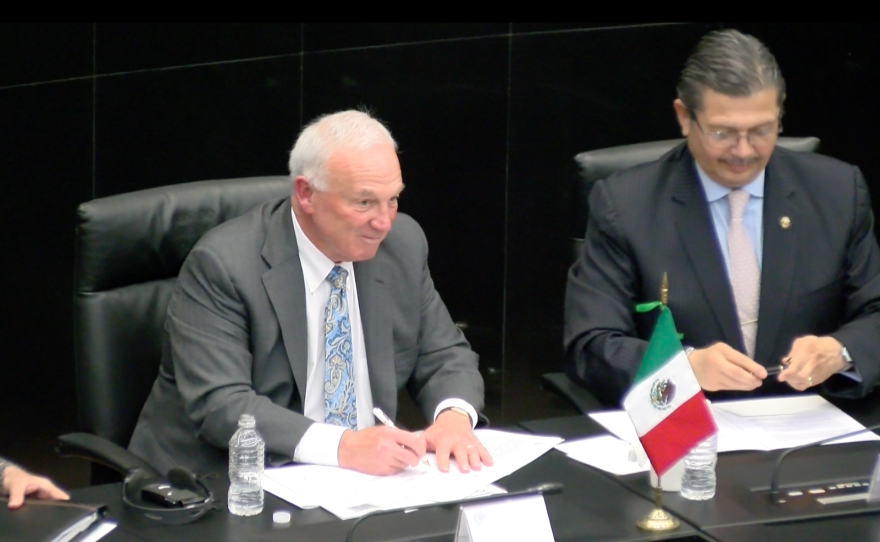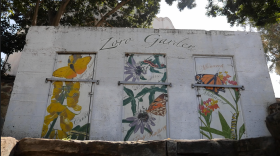Our top story on midday edition for the past 12 years leaders from San Diego and Tijuana have traveled to Mexico City for a binational discussion on trade. This year the stakes are higher than ever. There are nearly 90 members of the delegation led by then mayors of San Diego and Tijuana. The trip is sponsored by the San Diego Chamber of Commerce. The meeting began is Monday and Jean Durell has been there all week. She joins us from Mexico City. Welcome to the program. This trade delegation of Mexico City was always done to advertise the good working relationship between San Diego and the Tijuana region. This year is very concerned about the future of that relationship? I definitely feel like the people on the delegation -- they have been saying over and over that this is the most important delegation that the chamber has sponsored so far as -- precisely because of the relationship between America and Mexico are so uncertain because of President Trump and who is going to pay for the border wall. They had a fight on Twitter and a meeting between them was canceled the US-Mexico relationship has never been so lucky as it is right now. What is the specific message that Mayor Faulkner and the Tijuana mayor want to bring. They are trying to send what they call a unified message that the negative narrative that has dominated the conversation about the US-Mexico relationship does not apply everywhere they are asking the Mexico federal government not to give up on that relationship and the leaders believe that Mexico is a crucial business partner now and it will continue to be in the future. US is Mexico's largest trading partner in Mexico has recently been turning into Europe and Asia and South America trying to ask are other options [Indiscernible] which will be renegotiated you can have conversations about how that can happen. What sorts of Mexican officials is the delegation meeting with and what if any kinds of assurances have they gone? One of the most important meetings was with the foreign affairs minister -- it is a huge meeting. The delegation has ever -- never met with somebody so high up. Is the point person on renegotiations of NAFTA so for them to get this meeting was huge and he promised members of the delegation that he met with privately that he would ask the Mexican federal government to support new border infrastructure in the Tijuana region. For example is a port of entry that is planned for 2020 2021. There's been a lot of delays in getting that to move forward. He also said that they will help that move forward with. The -- they will issue a diplomatic note that is necessary for that to move on with. They met with them academic research sure the Deputy Minister of foreign affairs and the had some interesting remarks about NAFTA and how to be renegotiated in favor of the US-Mexico relationship. They talked about how a lot of the US's main competitors have a comparatively older population in North America. The keyword he said is that Mexico's population is what gives it the advantage of the argued for integrating the labor market and they are very interested in hearing that. Was also taught that San Diego Tijuana and the Mexican Senate signed an agreement. Do we know what is in it test? They decided they will meet twice a year and create a working group as well as Tijuana and San Diego business leaders and politicians that will meet twice a year to collaborate on border issues specifically border infrastructure immigration and trade so that is pretty historic they will be coming down here and have meetings about potential legislation [Indiscernible] and one of those meetings will be taken place in the region so they will be able to see firsthand some of the problems and needs of the region so they can make appropriate legislation It is coming up for the delegation's final day in Mexico City? There meeting with the deputy minister of foreign affairs about some of these same issues. They just got out of a meeting with Congress members where somebody raised the question of getting them to allow property owners on the beach and along the coast. That was very interesting. I've been speaking with reporter Jean Guerrero in Mexico City. Thank you so much.
The San Diego Regional Chamber of Commerce signed a historic memorandum of understanding with Mexico’s Senate on Tuesday, expanding the influence of San Diego and northern Baja California leaders on Mexican legislation related to ports of entry, trade and immigration.
The agreement establishes a working group made up of business leaders and politicians from the San Diego-Tijuana region, as well as members of the Mexican Senate.
The working group will meet twice a year through 2018, alternating between Mexico City and San Diego or Tijuana, to collaborate on legislation related to those key issues.
"This agreement serves as a model that others can use to establish their own agreements with Senate representatives," said Chamber President Jerry Sanders.
Sanders promised to share the memorandum of understanding with other business associations, economic development organizations and academic institutions promoting cross-border trade and the U.S.-Mexico relationship.
Paola Avila, vice president of international business affairs for the chamber, said the agreement to meet at least twice in the San Diego-Tijuana region instead of the Mexican capital is significant because "they'll be able to see first-hand our thriving economy."
She said the memorandum of understanding helps overcome misconceptions about the border region, noting that both Washington D.C. and Mexico City are far away from San Diego and Tijuana, so federal officials are sometimes out of touch with border realities.
The chamber is in Mexico City this week leading an annual delegation of nearly 90 business leaders and politicians from the San Diego-Tijuana region. They are pushing for port of entry improvements and the preservation of key elements of NAFTA, which they argue benefits both cities.
On Monday evening, a few members of the delegation met privately with Mexico's Foreign Relations Minister Luis Videgaray, the equivalent of the U.S. Secretary of State south of the border, who was "very responsive" to the delegation's requests, Avila said. Videgaray is Mexico's point person for upcoming NAFTA renegotiations with the U.S.

Videgaray promised to take a leadership role in advancing Otay II, a toll-operated port of entry planned for 2020 or 2021 in Otay Mesa, as well as to issue a diplomatic note necessary to allow a binational railroad to move forward through Tecate.
In exchange for that commitment, Avila said the delegation members promised to increase awareness in the U.S. about Mexico's importance as a trade partner. San Diego exports about $5.5 billion in goods and services to Mexico each year, and nationally, trade between the two countries was at $583.6 billion in 2015.
"We wanted to make sure he knew we were a partner," Avila said. "While there is a very negative message that has been received in Mexico, that is not shared by everyone. Our region is working every day to advocate in support and promotion of that relationship."
Videgaray has become a legendary figure in Mexico, leading sweeping structural reforms in Mexico's energy and telecommunications sectors as Economy Minister, then triggering a public outcry after inviting Trump to Mexico City during his campaign for president — a scandal that forced Videgaray to resign as Economy Minister.
He told the delegation members that in preliminary conversations with U.S. officials regarding NAFTA, "there is a willingness and an interest in working together on these infrastructure projects."







